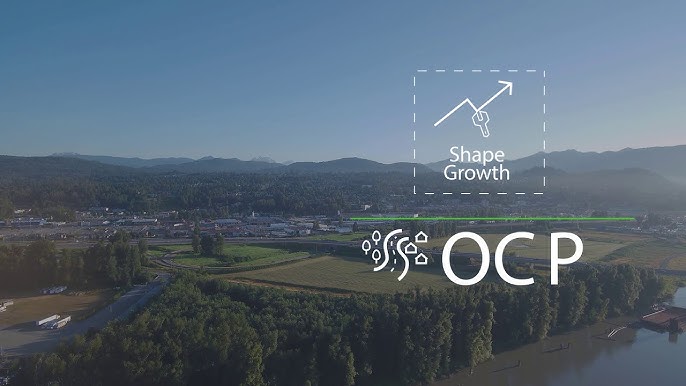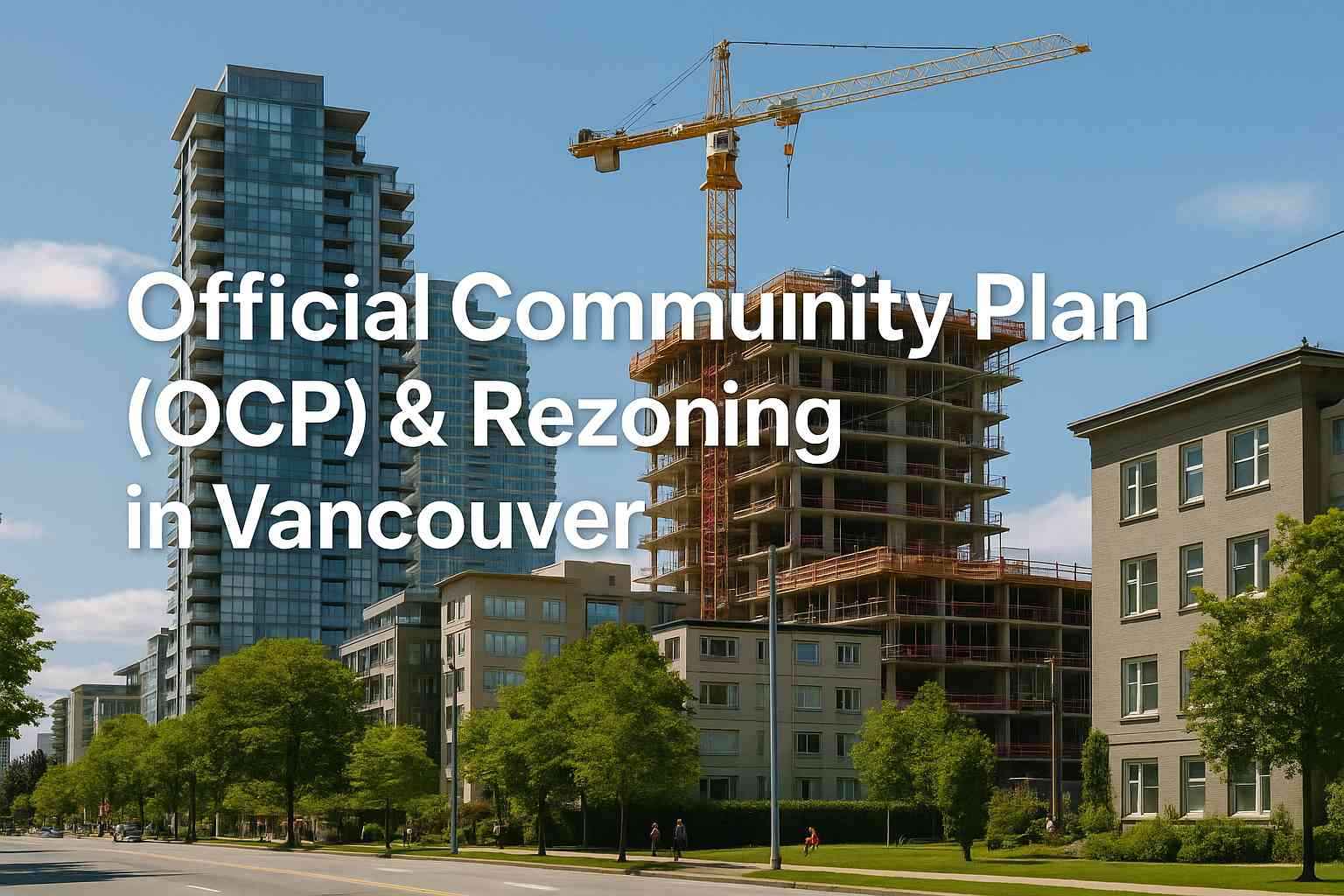As Vancouver continues to grow, its urban development is guided by a network of policies rooted in the Official Community Plan (OCP) and neighbourhood-specific plans. These frameworks shape everything from housing density and building heights to transportation routes, public amenities, and green infrastructure.
If you’re planning to rezone land in Vancouver, understanding how these plans impact your proposal is essential. In this guide, we’ll cover:
-
What the OCP is and why it matters
-
How it influences rezoning applications
-
Common challenges developers face
-
Steps to position your project for approval and long-term succes
What Is the Official Community Plan (OCP) in Vancouver?

Unlike some municipalities with a single OCP, Vancouver operates under multiple neighbourhood community plans that serve the same purpose. These include plans for areas like Broadway, Cambie Corridor, Grandview-Woodland, and Marpole — each with specific land use and growth objectives.
These plans define:
- Future land use designations (e.g., low-rise, mid-rise, mixed-use, commercial)
- Housing goals, including rental and affordable targets
- Transportation planning, especially near rapid transit
- Public amenities and parks contributions
- Sustainability targets and green infrastructure
When you apply to rezone, your proposal is assessed based on whether it fits these priorities. If not, you may need to revise the proposal — or apply for an amendment.
Many developers start with a detailed land development review to evaluate what’s possible under the current plan.
How OCP Influences the Rezoning Process
Rezoning allows you to request a change in the allowable use of a property — from single-family to multi-family housing, for instance — or to build taller or denser than current zoning allows. But the real question isn’t just “Can I build this?” — it’s “Does this fit Vancouver’s long-term vision?”
The city’s planning staff and Council assess your proposal’s alignment with:
- Transit-oriented development goals
- Environmental and climate resilience
- Housing affordability and diversity
- Infrastructure and amenity needs
- Equity and neighbourhood character
Rezoning proposals that support these objectives have a much stronger chance of approval — and move through the process more efficiently.
Rezoning Process in Vancouver: Step-by-Step With OCP Touchpoints
| Stage | How the OCP or Community Plan Plays a Role |
| 1. Property & Land Use Review | Confirms current zoning and whether your vision aligns with community land use policies |
| 2. Pre-Application Consultation | City planners advise whether your proposal supports policy goals or requires adjustment |
| 3. Rezoning Application Submission | Planners assess compliance with OCP and flag any inconsistencies |
| 4. Community Engagement & Feedback | Public input is framed around the plan’s objectives and expected impacts |
| 5. City Staff Report & Recommendations | Staff evaluate and recommend approval based on policy alignment |
| 6. Public Hearing & Council Vote | Final decision is made with OCP principles as a key benchmark |
| 7. Development Permit & Implementation | Projects aligned with policy tend to move more smoothly through the next phase |
Before beginning, many clients engage pre-construction management experts to coordinate planning, technical studies, and stakeholder communication.
Common OCP-Related Challenges Developers Face
Even with a compelling proposal, developers may encounter policy-related roadblocks:
- Mismatched Land Use: A proposal for mid-rise residential in a low-density area may conflict with land use designations.
- Insufficient Amenities: The plan may call for additional parks or school capacity before new density is added.
- Community Pushback: If a proposal is inconsistent with the plan’s vision, neighbourhood opposition may increase.
- Infrastructure Conflicts: Projects must often support upgrades to water, sewer, or transit outlined in the plan.
That’s why experienced developers often turn to rezoning consultants to prepare technically sound and policy-aligned applications.
When Is an OCP or Community Plan Amendment Required?
If your development vision significantly exceeds what the plan allows — for example, proposing 12 storeys in an area capped at 6 — you may need to apply for a community plan amendment.
Amendments are typically required when:
- Your proposal introduces a new building form not previously contemplated
- The density exceeds plan thresholds
- You’re proposing a new land use type (e.g., retail in a residential-only corridor)
- Major environmental or transit changes must be reviewed
Plan amendments involve broader analysis, additional community outreach, and often, multi-phase land development coordination.
Why Financial Planning Is Key to Rezoning Success
A project may receive approval — but without financing and long-term planning, construction may never begin. This is especially true for projects involving rental housing, affordable units, or phased development.
At this stage, securing construction financing solutions tailored to Vancouver’s market conditions is essential. Many developers factor in financing feasibility before even submitting their rezoning applications.
How to Align Your Development with Vancouver’s Rezoning Policies
If you’re planning a project that involves rezoning land in Vancouver, aligning with the Official Community Plan (or neighbourhood-specific plans) is your best strategic move.
Checklist for OCP-Ready Rezoning Applications
✔ Research your neighbourhood plan
✔ Book a pre-application meeting
✔ Align with housing and amenity goals
✔ Prepare technical studies early
✔ Partner with rezoning and land-use experts
✔ Model financing scenarios for long-term viability
Navigating Vancouver’s Official Community Plan with Confidence
The impact of Vancouver’s Official Community Plan on rezoning applications reaches far beyond policy — it affects timelines, community support, and overall project success. Developers who align their proposals with current land use plans not only reduce friction but also gain a clearer path toward approval.
As urban development becomes more complex, many project teams rely on local firms with specialized experience in land strategy, rezoning applications, stakeholder engagement, and financial planning. These professionals often bring deep knowledge of Vancouver’s evolving planning framework and offer integrated support that spans from early feasibility studies to post-approval project coordination.
For those exploring similar projects or seeking guidance on aligning with Vancouver’s planning objectives, reviewing examples and insights shared by local development experts online can be a helpful place to start — especially those who regularly work across land development, rezoning, and pre-construction management in the Lower Mainland.


